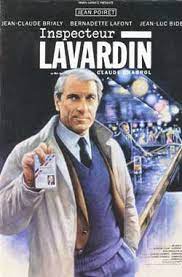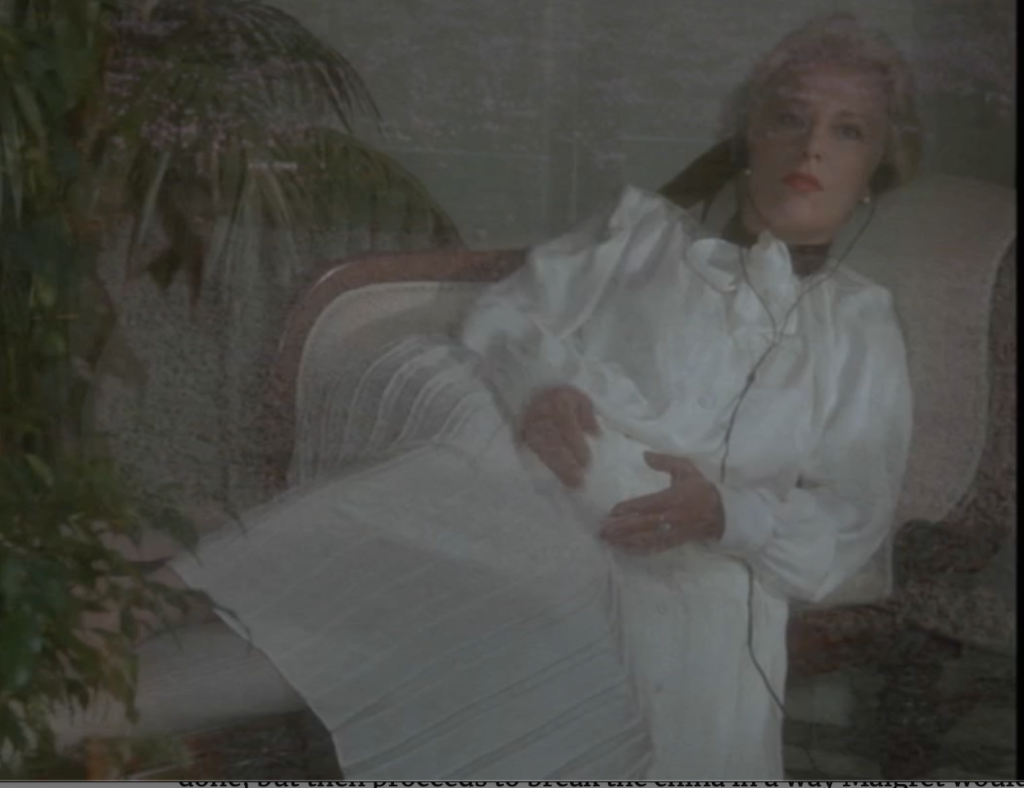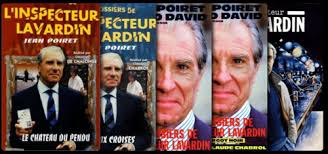IMDb meta-data is a run-time of 1 hour and 40 minutes, rated 6.6 by 1,200 cinematizens.
Genre: krimi.
Verdict: The aliens are among us.

To sum up, it is detached and indifferent, off-set by the eye-candy of provincial France which makes a nice change from either Paris or Marseilles. The plot is neat but the direction is lethargic.
Some marvellous Claude Chabrol images, especially of Bernadette LaFont; in opening and closing shots she appears as beautifully lifeless as a butterfly pinned to a card under glass. That she is so emotionally remote is a Chabrol meme, but in this film she has competitors. The household where the action is largely confined is as lively as a wax works. Though they are oddballs for the sake of being odd (and not to move the plot), they are largely inert.

Then for we trolls there is Lavardin’s bottomless suitcase from which he extracts an endless wardrobe of suits, sport coats, and neckties to put on under the ever-present trench coat. He always looks like he just stepped out of a glossy magazine advertisement and just about as animated. That coat is a parody of the genre from Chabrol, one worn thin with repetition.
The only life among the ensemble is projected by the sleazy nightclub owner who gives the imbeciles what they what at a premium and the wanna be blackmailer. These two actors inhabit their parts with conviction. Everyone else is so cool and remote as to be different lifeforms.
Lavardin insinuates himself into the household rather as Maigret would’ve done, but then proceeds to break the china in a way Maigret would not. Moreover, the insertion is automatic and not an accomplishment. No sooner does the inspector appear than he is a guest at the table.
The idea that Jean Poiret as Lavardin could be a tough guy in the Jean Gabin mould stretches the suspension of disbelief too far. Snap! He is trop petit et beau for such muscle. Gabin had iron in his soul and it showed on camera, but not this greying pretty boy with designer suits.
Even more tiresome, Lavardin shows no insight as a detective and is completely surprised by the denouement, but that in no ways dents his smug egotism. That is Chabrol irony, I suppose but it is not very entertaining. He seems to be degrading the very coin he is spending.
There was a time when Chabrol could coax some powerful performances from actors and that made his reputation. It was said that he treated the actors as in-role from the start on and off the set. If I was playing Max, he would call me Max, even at the bar after work. And his treatment would match the character of Max.
Ditto for L’escargot noir (1988): IMDb overrated 6.9 by 57. While the magnetic Stéphane Audran is listed in the credits and that was enough for me, she has two scenes near the end. Why bother with such a great player for that. Hrrumph! No one in this outing takes the roles seriously, though once again the plot is ingenious and once again, despite his posturing, Lavardin misses the point entirely, even when holding the clincher in his hand, even after a disturbing scene with a grandmother in a church that seems out of place; was it an editing error? It had been obvious from the first 30-minutes who had to be the villain. Once again his suitcase is bottomless. Once again the charms of provincial France are on display. Once again the viewer leaves the table hungry.
Double ditto for Maux croisés (1989) rated 6.9 by 10 members of the director’s family, which limps, though the plot idea is neat, the execution is woeful. None of the players take it seriously and the sumptuous spa hotel is barely exploited. The guilty parties might as well have signs pinned on, and the background game show makes even less sense. Once again the bottomless suitcase is there. One scene is simulated in a rainy Firenze and many of the players speak French with an Italian accent.
The last was first. I watched last the first instalment of Inspector Lavardin, Cop au Vin (Poulet au vinairgre) (1985), run time of 1 hour and 50 minutes, rated 6.6 by 10 cinematizens. That viewing sequence wasn’t intentional, just the way they came up on the Plex server at home. This one certainly shows the old Chabrol in the first mysterious 45 minutes or so, and offers some splendid performances, one from Stéphane Audran, as an obsessive, manipulative mother of a young man, played by Lucas Belvaux, who is also very well drawn in what was a difficult part to play. Lavardin applies the vinegar in beating a boy and a pensioner to show he is tough, always confident no one will hit back, hiding behind to his police identity card and the director’s assurances. The bottomless suitcase is there. Others are so tolerant of his violence and enigmatic remarks that they must have been well paid. Some characters seem crucial and then disappear.

By the way, the musical scores were a major plus in all four episodes.
Provincial France as shown in these films is whiter than white. Not a hint of tint of the Maghreb is to be seen. Not even a colonial* restaurant is passed in the streets.
All in all, I was disappointed by the four DVDs. True, there were excellent moments, but like Wagner operas they went on and on and those moments became fewer and farther between. Chabrol’s own obsession with ridiculing the provincial bourgeoisie seems adolescent. Likewise his contempt for his own character, Lavardin, the lone ranger, who comes out of the mists, wreaks violence, and leaves is very spaghetti western without the parody, wearing thin quickly. A Maigret he is not.
P.S. It is unorthodox in that Flics are usually portrayed in film as fools (Louis de Funès), corrupt thugs (Gérard Depardieu), or square-jawed defenders of the Republic (Jean Reno). I leave the redoubtable Jules Maigret and his many incarnations in a separate and singular class.
* The first time I patrolled the food floor of the Galerie Lafayette in Paris in 1980, there was a section labeled ‘Cuisine coloniale’ where a few items from IndoChina (rice) and North Africa (harissa) were displayed.

